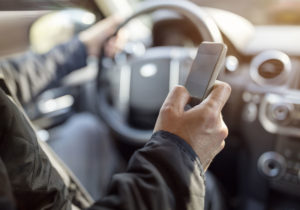Filing a Lawsuit After an Uber or Lyft Car Accident?
Ridesharing companies like Uber and Lyft are quickly eclipsing cab companies for individuals’ transportation needs. Many individuals rely upon these ridesharing companies for transportation around large urban areas to go to and from work and for recreational activities.
However, with many Uber and Lyft vehicles on the road comes the possibility of severe accidents and injuries.
Because ridesharing vehicles are a relatively new concept, there is not a significant amount of case law about how to handle these accidents from a personal injury perspective. Consequently, if you suffer injuries in a rideshare accident, consult an experienced rideshare accident attorney as quickly as possible.
Your attorney can review the circumstances of your accident with you and evaluate potential insurance options for your case. Your lawyer can file a claim with the insurance company on your behalf and aggressively negotiate with insurance company settlement adjusters. Finally, if the insurance company does not make you a fair monetary settlement offer, then your lawyer may file a lawsuit against the at-fault party or parties.
Every step of the way, your lawyer will aggressively advocate for your legal interests and pursue the maximum compensation you deserve to recover for your injuries.
Your lawyer can also represent you at all legal proceedings in court, introduce evidence, and pursue a favorable jury verdict or binding arbitration award in your case.
Rideshare Accident Injuries

Just like motor vehicle accidents that involve traditional passenger vehicles, rideshare accidents can lead to debilitating injuries for Uber and Lyft passengers.
The injuries that a rideshare accident victim may suffer frequently depend on the specific circumstances surrounding the accident, the victim’s bodily movements inside the vehicle at the time of the crash, and the body parts or parts affected in the accident.
Common rideshare accident injuries include facial injuries, bruises, open lacerations, rib fractures, soft tissue neck and back injuries, internal bleeding, internal organ damage, mouth and teeth injuries, eye injuries, spinal cord and paralysis injuries, scarring, traumatic brain injuries, permanent cognitive impairment, and death.
After suffering injuries in a rideshare accident, accident victims must undergo the medical treatment that they need to make a full recovery.
For example, an accident victim might need to consult their primary care doctor, visit a medical specialist, undergo surgery, and attend follow-up physical therapy appointments, depending upon the nature and extent of their injuries.
By completing a prescribed medical treatment regimen, a rideshare accident victim significantly heightens their chances of achieving a full recovery. Additionally, they show the insurance company that their injuries are real and that they deserve favorable monetary recovery for them.
In the meantime, a rideshare accident lawyer can begin advocating for your legal rights and interests. Specifically, your attorney may begin gathering important documents in your case, including police investigation reports, medical treatment bills, and medical records.
Upon receiving this documentation, your lawyer can assemble the necessary documents into a complete settlement demand package for the insurance company to review.
How Do Rideshare Accidents Typically Happen?
Like other motor vehicle accidents, rideshare accidents typically happen when people drive recklessly and negligently. Sometimes, it is the Uber or Lyft driver, but a third-party driver may also cause or contribute to a rideshare accident.

Some of the most common types of driver negligence that occur include disobeying traffic regulations, engaging in distracted driving, exhibiting road rage, and operating a vehicle while under the influence of alcohol or drugs.
First, some car accidents happen when drivers fail to follow various road rules.
Common driving violations that may lead to an accident include:
- Failing to yield the right-of-way at a traffic intersection.
- Speeding.
- Tailgating other vehicles.
- Failing to use mirrors.
- Failing to use turn signals at the appropriate times.
Accidents may also happen when drivers fail to use lane change warnings, backup cameras, and other technological devices on their vehicles.
Additionally, traffic accidents may happen when drivers fail to watch the road attentively. With the many electronic devices in today’s vehicles, it is very easy for drivers to become distracted and take their eyes off the road.
Some of the most common driver distractions include cellular phones and tablets, GPS navigation systems, loud music playing in the vehicle, and other vehicle passengers.
A distracted driver may comb their hair, apply makeup, eat, or drink while attempting to drive at the same time. All these activities may cause a driver to lose their focus and bring about a serious accident.
Rideshare accidents may also happen when a driver exhibits various types of road rage or reckless driving. Some drivers become upset when other traffic moves too slowly. Such a driver might resort to tailgating other vehicles, aggressively honking their horn, weaving through traffic without using a turn signal, or passing other vehicles in a no-passing zone.
All these reckless driving maneuvers may cause severe and forceful collisions that injure other people.
Finally, some rideshare accidents directly result from drinking and driving. An intoxicated rideshare driver puts rideshare passengers at significant risk.
Drunk drivers frequently experience various mental and physical symptoms that prevent them from operating their vehicles carefully and safely. For example, a drunk driver may suffer from delayed concentration, impaired reflexes, delayed reaction time, lack of coordination, and an inability to judge distances. Similarly, they may experience physical symptoms like blurred vision or dizziness.
If you sustained injuries in a rideshare accident that a negligent driver caused, talk with a knowledgeable rideshare accident lawyer in your area as quickly as possible. Your attorney can evaluate all your legal options so that you can make intelligent and informed decisions about how to proceed with your case.
How Does Insurance Coverage Work in a Rideshare Accident?
The insurance policy or policies that might apply in a rideshare accident depend upon several factors, including the jurisdiction where your accident happened, the time when the accident happened, and the type of ridesharing vehicle you were in at the time of the collision.
For example, if your rideshare accident occurred in a no-fault state like Florida, you first turn to your personal injury protection (PIP) insurance coverage. PIP coverage compensates accident victims for various out-of-pocket losses, including medical expenses and lost income.

In general, an Uber corporate policy of $1 million per accident and $1 million in the aggregate is in effect the moment the Uber driver accepts a ride fare using their smartphone. Their policy limits stay effective until the Uber driver drops off the passenger at their destination.
The $1 million policy limits apply to both underinsured and uninsured motor vehicle accidents.
In an underinsured accident scenario, the at-fault driver who causes the accident has some liability coverage. However, if it will not fully compensate the accident victim for all their damages and losses, the injured accident victim will turn to the at-fault driver’s policy, exhaust their policy limits, and then file an underinsured motorist claim with the proper carrier.
In an uninsured motorist accident scenario, the driver who caused the accident does not have any motor vehicle coverage, or they may have fled the accident scene. In that situation, the accident victim can turn to the uninsured motorist policy for financial coverage.
In rideshare access scenarios where the Uber driver has not accepted a ride fare but does have the app on their smartphone activated, the applicable policy limits in the event of an accident are $50,000 per individual, $100,000 per accident, and $25,000 for property damage.
In some cases, Uber drivers cause rideshare accidents because of their own negligence. In those situations, the Uber driver’s individual liability insurance policy may provide the coverage necessary to compensate accident victims for their injuries.
The applicable limits of coverage in Lyft vehicle accidents are slightly different. In cases where the Lyft driver has activated the app on their smartphone, and they are waiting to accept a fare, the Lyft corporate policy may cover a motor vehicle crash.
Under that policy, the coverage limits are $50,000 per person, $100,000 per accident, and $25,000 for property damages. However, if a Lyft driver does not have their smartphone app running and a collision happens, then their individual policy steps into play.
If a passenger is in the Lyft vehicle, and the driver is proceeding with a passenger to a destination, then $1 million of Lyft coverage applies, and it remains in effect until the driver reaches the passenger’s destination. Underinsured and uninsured motorist coverage apply during this time.
Suppose you recently suffered injuries in a rideshare accident. In that case, you need to have an attorney on your side who can determine the applicable insurance policy or policies, as well as the applicable coverage limits.
Your attorney can file a claim under the appropriate policy on your behalf and begin pursuing the financial compensation you need for your accident-related losses.
Filing a Claim or Lawsuit for Monetary Compensation
As part of a rideshare accident, injured passengers may be eligible to receive various types of monetary compensation. In a third-party claim, the accident victim must establish that the Uber driver or another driver violated their legal duty of care by acting unreasonably.
For example, a driver might have violated one or more traffic laws or operated their vehicle while intoxicated or distracted. As a direct result of the driver’s negligence, both the accident and the claimed injuries must have occurred.
To recover third-party damages in a rideshare accident case, your car accident lawyer can file a claim with the appropriate insurance company on your behalf.
In any situation, an attorney will need to negotiate these claims aggressively. Insurance companies will offer the lowest amount of compensation they possibly can get away with offering. Insurance company adjusters take this approach to save their insurance companies significant money.
To increase a settlement offer, your lawyer can highlight the various strengths of your case, downplay any weaknesses, or threaten the insurance company with litigation.
If your case proceeds to litigation, settlement negotiations may continue. If the matter does not settle by the end of litigation, you may take your case to a civil jury trial, and the jury will decide the issue of monetary damages. Similarly, you can pursue alternative dispute resolution (ADR), for example, binding arbitration or mediation.
The monetary damages that rideshare accident victims may recover will vary significantly from case to case, depending upon the circumstances. Generally, the more serious an accident victim’s injuries, the higher their likelihood of recovering a favorable monetary damage award.
Possible types of monetary compensation for a rideshare accident include payment of medical expenses, lost income, and loss of earning capacity. Accident victims may also pursue compensation for their intangible losses, such as inconvenience, mental distress, past and future pain and suffering, lost quality of life, loss of use of a body part, and loss of spousal consortium.
Your attorney will do everything possible to maximize your monetary settlement or litigation award, enabling you to become whole again after your accident.
Contact a Rideshare Accident Lawyer Today

If you suffered injuries in a recent rideshare accident, you must file your lawsuit within the applicable statute of limitations time frame. After entering an appearance in your case, your attorney will aggressively fight for your legal rights and interests and work to pursue the monetary compensation you truly deserve for your injuries.
Uber and Lyft know how to defend against accident claims and limit liability whenever possible. Never take on their corporate insurance companies alone – seek professional legal representation from a personal injury attorney with experience handling rideshare claims. Consultations are free.
Free Consultation
We Are Here For You 24/7
Reviews
– Elissa M.
“Really pleased with Boohoff Law! Received immediate responses when I had any questions. Treated amazingly by all staff … made this process a true breeze!”
– Caitlyn M.
– Brandy K.
Related Posts
When to Hire a Personal Injury Lawyer
How Much Does Workers’ Comp Pay for a Back Injury?
How to Get the Most Money From a Car Accident
Recovery is personal.
You're better off with Boohoff.











The information on this website is for general information purposes only. Nothing on this site should be taken as legal advice for any individual case or situation. This information is not intended to create, and receipt or viewing does not constitute, an attorney-client relationship.
available 24/7
(877) 999-9999
